| Srl | Item |
| 1 |
ID:
140736
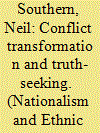

|
|
|
|
|
| Summary/Abstract |
The main work of South Africa's Truth and Reconciliation Commission (TRC) took place between 1996 and the publication of its final report in 1998. Its purpose was to assist citizens come to terms with the violence of the past. All participants in the conflict were subjected to the Commission's investigations including the National Party that had held power from 1948 to 1994. During these years, the party became well established as both an ethnic and racial party. However, support for it fell dramatically between 1994 and 1999 (the year after the TRC published its report). The party's fortunes worsened in the 2004 elections that resulted in its dissolution in 2005. This article explores the effects of the truth-seeking process on the electoral fortunes of the party. The analysis makes use of unique qualitative material gained from research conducted with former senior members of the National Party including two cabinet ministers.
|
|
|
|
|
|
|
|
|
|
|
|
|
|
|
|
| 2 |
ID:
117507
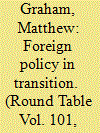

|
|
|
|
|
| Publication |
2012.
|
| Summary/Abstract |
At the beginning of the transition from apartheid to democracy, the African National Congress (ANC) was unprepared for foreign policy discussion, a lack of readiness magnified by the collapse of international Communism and the Cold War ideology. President De Klerk and the National Party controlled foreign policy in the early years of the transition and began the process of reintegration with the international community, The ANC initially struggled to adapt to the new international situation, whereas De Klerk was successful in wooing the international community. In the later stages of transition, the ANC developed a greater sense of direction and substance in foreign relations, although there were differences of opinion among and between the leadership and the rank and file. Already in 1994 there was evidence of tension between idealism and pragmatism. Post-apartheid foreign policy under Mandela was riddled with inconsistencies, which stemmed from the events of South Africa's transition
|
|
|
|
|
|
|
|
|
|
|
|
|
|
|
|
| 3 |
ID:
156208
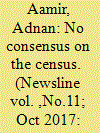

|
|
|
| 4 |
ID:
173867
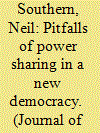

|
|
|
|
|
| Summary/Abstract |
A key political feature of South Africa's transformation was the African National Congress, the National Party and Inkatha Freedom Party working together in a grand coalition. This arrangement was praised by leading power-sharing theorist Arend Lijphart. The unity government began in 1994 but two years later the National Party withdrew. This article explores power sharing during the initial phase of the settlement and discusses three aspects of it. First, the South African example points to the electoral drawbacks of power sharing for minor parties. Second, the National Party's participation in the coalition stifled the early development of substantial political opposition which slowed the pace of democratic consolidation. Third, participation in a power-sharing arrangement undermined the National Party's electoral fortunes contributing to its dissolution in 2005. This was an unexpected outcome for a party which had co-authored the country's settlement a little over a decade earlier.
|
|
|
|
|
|
|
|
|
|
|
|
|
|
|
|
| 5 |
ID:
122862
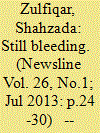

|
|
|
| 6 |
ID:
123432
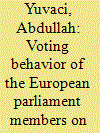

|
|
|
|
|
| Publication |
2013.
|
| Summary/Abstract |
By quantitatively analyzing how Members of the European Parliament (MEPs) voted on an amendment that proposed a special status for Turkey, this article aims to shed some light on the voting patterns of MEPs on the question of Turkish accession to the European Union. The article finds that although member-state and European party group affiliations were related to MEPs' voting behavior on Turkey, MEPs' national party preferences were the strongest predictor of the vote. In addition, the study shows that the GDP per capita and public opinion were also highly correlated with MEPs' voting attitudes toward Turkish accession.
|
|
|
|
|
|
|
|
|
|
|
|
|
|
|
|
| 7 |
ID:
119587
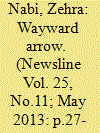

|
|
|